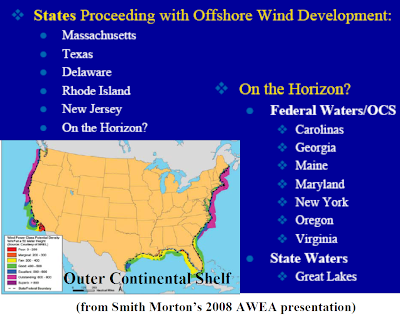FEDS SERIOUS ABOUT OCEAN WIND
BOEMRE Sets More Aggressive Approach To Offshore Wind Permitting
Daron Threet and Steven Wellner, 19 May 2011 (North American Windpower)
"Over the past several months, the U.S. Department of the Interior's (DOI) Bureau of Ocean Energy Management, Regulation and Enforcement (BOEMRE) - the lead federal permitting agency for offshore wind - has aggressively stepped up its efforts to review and permit the first wave of offshore wind projects…
"The regulatory process for gaining the necessary approvals to construct and operate wind farms in federal waters generally three miles or more from shore has been slow to develop. However, the DOI and BOEMRE have recently taken steps to revamp and implement new permitting and leasing procedures to streamline and speed up the overall process."
 click to enlarge
click to enlarge"The most significant change in the federal review framework was implemented…as part of a broader effort by the Obama administration to expedite deployment of renewable resources on federal lands.
"…DOI adopted a new, streamlined approach to lease issuance by deciding to identify potential lease areas, known as wind energy areas (WEAs), and to issue leases in the WEAs upon BOEMRE's completion of regional environmental assessments (EAs) under the National Environmental Policy Act (NEPA), a far less time- and resource-intensive process than developing full-blown environmental impact statements (EIS)."
 click to enlarge
click to enlarge"Only after BOEMRE issues an individual lease would it prepare an EIS to evaluate the specific environmental impacts of the actual project to be constructed and operated on the leased site. The importance of this new procedure cannot be overstated, because eliminating the need for an EIS at the leasing stage should shave years off of the current permitting time frame…
"As a new industry in the U.S., the offshore wind industry faces many challenges, but with increasingly bold and decisive leadership at the federal level, the complex permitting process is becoming more streamlined, which will significantly reduce the regulatory burdens and associated risk of developing the first offshore wind projects in the U.S…"

 Your intrepid reporter
Your intrepid reporter





0 Comments:
Post a Comment
Note: Only a member of this blog may post a comment.
<< Home